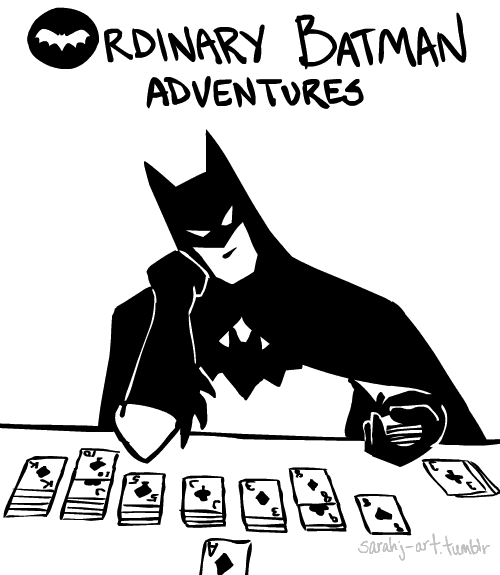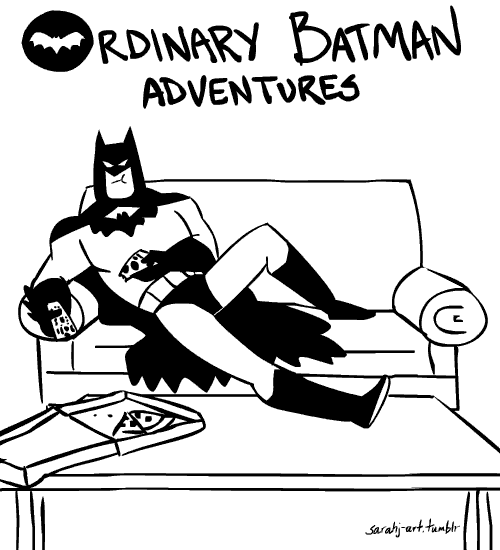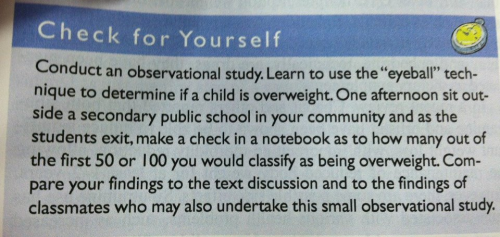What does Batman do in a quiet week?
This nice little lo-fi gif collection of animated Batman portraits goes some way to unmysterying (or demystifying) the mystery.


What does Batman do in a quiet week?
This nice little lo-fi gif collection of animated Batman portraits goes some way to unmysterying (or demystifying) the mystery.


Thanks Textbooks collects badly thought out sections from academic works.
Some examples…





You can, of course, explore more single serving Tumblrs in the Tumblrweed archives.
Wow. What a gut punch. The nurse who took a prank call from an Australian radio station, where staff pretended to be the Queen, and Prince Charles, has, it appears, taken her own life.
There seems to be a pretty strong causal link between the call, and this outcome.
Plenty of people have responded by condemning the Australian pair. I read someone suggesting they should be charged with manslaughter. That is, frankly, ridiculous.
Playing the blame game in a tragic situation like this is ridiculous.
Blame is not the appropriate response to tragedy. It just makes tragedy worse.
It’s a tragedy. A mother of two. A wife of one. And surely a friend to many… lost. It’s awful. Indescribably awful. There are no winners in this situation now. None. But there are people who are going to feel this loss, and their grief is going to be preyed upon by a hungry and vicious British press, feeding a bunch of people who want to see blood. Everybody is voicing their shock on social media. Because it’s truly shocking.
But words have consequences. Even unintended consequences. The consequences become bigger as the words are given more importance – and in this case some relatively harmless words have become harmful because they’ve been amplified.
It would be easy to point fingers at just about anybody in this situation, but establishing agency and causation is almost impossible. What follows is an exercise in futility. It’s particularly fruitless, because already, once the chain of events kicked off the way it did, there weren’t any winners, just victims – well, except the one group who wins either way…
The prank callers – sure, if they hadn’t called anybody then this wouldn’t have happened. They’re now under siege from all over the world, and people are saying horrible stuff about their responsibility for events. Give them a break. They couldn’t possibly know this was going to happen when they sat down and sketched out a pretty funny prank concept. But they were doing their job…
So we could blame the radio station – sure, for pushing comedy based programming, but people love prank calls, and this one was mostly harmless – and the callers were expecting to be hung up on immediately. The British press is having a field day dragging out stories about Kyle Sandilands. They sure do love controversy… but then so do their listeners…
So we could blame Australian culture – we listen to, and love, commercial radio comedians, and their audacious prank calls. But we’re a world away from the events in England.
We could blame the hospital – but the administration has been incredibly, and publicly, supportive of the nurses involved. They blame the callers. And blaming the hospital goes mighty close to blaming the victims… the nurses – one of whom has now become, tragically, the biggest victim.
We could blame the royals, for not immediately hosing down the event, and refusing to comment. But they’re under constant scrutiny, and even in this most private of moments are suffering from media attention. And suggesting what might have been – an immediate statement of forgiveness, laughing the whole thing off – would have produced better results is an exercise in the hypothetical. It may have resulted in thousands of copycats. Prince Charles seemed to think it was funny.
We could blame the culture clash – It’s, on the surface, an awful example of two cultures with a lot in common not quite sharing the same sense of humour. The prank was funny. Most of us are incredulous that it worked the way it did. That’s how pranks get laughs. The British weren’t amused. Turns out a common love for irony, not shared by the Americans, doesn’t extend to a common love of taking the proverbial out of their royals.
The British press – they’re the only winners in this situation. They’ve got a controversy to inflame, victims to profile, royals to protect. They turned the prank into a “cruel international hoax,” and blew away any sense of proportion. So, now the story serves to demonstrate the power of a rabid and angry British media. The same British media that protects the royals when it suits them, and publish naked pictures of the same royals, taken with a telephoto lens, while they’re in a private place, on a holiday, when it suits them.
But blaming the press isn’t really all that worthwhile, you can’t blame them without blaming the people who consume their products – the audience dictates what the commercial press prints. So do the advertisers. So do the people who buy the advertisers products.
Essentially. We’re all to blame. And we’re all victims. Victims who have to live in a world where horrible stuff like this happens.
Now, I don’t want to make mileage from this tragic set of circumstances. That’d be ghoulish. This really is awful. And as a guy, behind a keyboard, thousands of kilometres, and a cultural jump away, I’m feeling only a small amount of the grief that those closer in proximity will be feeling at this loss of life. Every time I think about that poor husband, and those poor kids, I want to yell at someone. Blame someone. And I’m pretty detached from the circumstances. The best I can do is pray for that family, and, given the above – pray for our world. The kind of world that creates the environment for this sort of thing…
But imagine a world, for a moment (channeling John Lennon), imagine a world where, say this prank call still happened – because it’s not a perfect imaginary world – imagine it happened, and the mistake was made in receiving it… imagine if the first victims acted in forgiveness immediately. Imagine if they had immediately spoken out to forgive not just the nurse, and the hospital, but the callers. That would have robbed the story of its sting. The press couldn’t be indignant about a story where there’s no victim, the nurse would have nothing to fear. The story would’ve fallen off the middle pages of the paper within days, if not hours.
Imagine if the press was forgiving. Imagine if, given the tragedy, we didn’t just band around the family of the nurse, which is good and right, but around the radio presenters who I can imagine, as humans, are now suffering incredibly deep feelings of remorse and regret, questioning their own agency in proceedings, and blaming themselves…
Imagine if there was a royal who, when persecuted, forgave the masses who perpetuated the persecution. The clamouring crowds, baying for blood. The feeding frenzy of a public who just want to see a spectacle – with no real regard for justice being served. Imagine a king who when misunderstood, who is suddenly the centre of attention, all eyes on him, as he is nailed to a cross – killed for simply being who he is – called out:
“Father, forgive them, for they know not what they do.”
Imagine a world where more of us, in more circumstances, followed that king. Imagine if, even when tragedy happened, we didn’t look for who to blame, but for who needs love and forgiveness – and we offered it, even if they were doing us wrong.
Imagine if we acknowledged that we were in the wrong – rather than looking to blame others – and we went after forgiveness, from the victims – but also from Jesus, the king, who was put in the above circumstance by us too – the crowd baying for blood 2,000 years ago, the crowd baying for blood (and cheap entertainment via the media) now – we’re part of both of them. We’re to blame. We need forgiveness. We’re participants in this culture that creates victims all over the place.
I guess that’s my biggest prayer, and the point where I can take the most action in response to these circumstances, and this world. I really want people to know Jesus because modelling that kind of forgiveness, and that kind of willingness to turn the other cheek, actually stops tragic events like this happening.
Argh. Tim Allen is on my TV. He’s not Santa yet – but the transition from Grinch to all round good guy is beginning. It’s almost enough to send me in the opposite direction.
Anyway. Here’s a nice little Christmas tune, from Pentatonix, that five piece a cappella group who did that Gotye cover.
They’ve got a Christmas Carols album out on iTunes. Exciting if you like that sort of stuff. I guess. And certainly better than Tim Allen.
Back in ancient Rome there wasn’t “PR” or “Marketing” or “social media” but there was a “public square” and there was “communication” and there most certainly was “persuasion” and “propaganda” – and it largely depended on rhetoric, and oratory, and the type of oratory most highly prized was eloquence.
Cicero was a bit of an expert on eloquence, and oratory. Not only did he publish a bunch of material on how to speak, and be eloquent, other famous people like Julius Caesar, dedicated their own published works on oratory to him. This makes him an ancient expert, somewhat anachronistically, on public relations, and communication. All you have to do is replace “Oratory” with “communication” and “eloquence” with “being good at communicating”…

Image Credit: Cicero Statue, The First Premise, Cicero
As I read through Cicero’s handbooks and other stuff for a bit of research, and for fun, I’m struck over and over again by how timeless his principles and advice are. His single-minded pursuit of oratory excellence, and thus, excellence in communication led him to study communication, and persuasion, from its earliest days as a science – to his present day, an approach we can probably learn from, even if we want to pretend everything of value has been invented in the last couple of generations (and even if we don’t – it’s worth seeing how timeless truth is).
He acknowledges that this pursuit is pretty difficult, because while there are some objective qualities of good oratory, and an objective essence of good communication – that all communication can be judged on, the actual act of communication is almost purely subjective.
“How then shall we strike out a general rule or model, when there are several manners, and each of them has a certain perfection of its own? But this difficulty has not deterred me from the undertaking; nor have I altered my opinion that in all things there is a something which comprehends the highest excellence of the kind, and which, though not generally discernible, is sufficiently conspicuous to him, who is skilled in the subject.”
Here are 10 things I think modern communicators can learn from Cicero, with some quotes (and if you hit the “read more” link after the list, there’s a bunch of quotes from his Cicero’s Brutus or History of Famous Orators, and The Orator).
It’s a pretty long post including the quotes – sorry if it all makes it into the RSS feed.
“He, therefore, is the man of genuine Eloquence, who can adapt his language to what is most suitable to each. By doing this, he will be sure to say every thing as it ought to be said. He will neither speak drily upon copious subjects, nor without dignity and spirit upon things of importance; but his language will always be proportioned, and equal to his subject.”
“…the simple and easy Speaker is remarkably dexterous and keen, and aiming at nothing but our information, makes every thing he discourses upon, rather clear and open than great and striking, and polishes it with the utmost neatness and accuracy.”
“For every cause can have but one natural introduction and conclusion; and all the other parts of it, like the members of an animal body, will best retain their proper strength and beauty, when they are regularly disposed and connected.”
“This kind of Oratory will likewise be frequently enlivened by those turns of wit and pleasantry, which in Speaking have a much greater effect than is imagined. There are two sorts of them; the one consisting in smart sayings and quick repartees, and the other in what is called humour. Our Orator will make use of both;—of the latter in his narratives, to make them lively and entertaining;—and of the other, either in giving or retorting a stroke of ridicule.”
“But in the use of metaphors, he will, perhaps, take greater liberties; because these are frequently introduced in conversation, not only by Gentlemen, but even by rustics, and peasants: for we often hear them say that the vine shoots out it’s buds, that the fields are thirsty, the corn lively, and the grain rich and flourishing. Such expressions, indeed, are rather bold: but the resemblance between the metaphor and the object is either remarkably obvious; or else, when the latter has no proper name to express it, the metaphor is so far from appearing to be laboured, that we seem to use it merely to explain our meaning.”
“But (as I have before observed) I have been so much transported, not by the force of my genius, but by the real fervor of my heart, that I was unable to restrain myself: —and, indeed, no language will inflame the mind of the hearer, unless the Speaker himself first catches the ardor, and glows with the importance of his subject.”
“The general merit of an Orator must and will be decided by the effects which his eloquence produces. For (in my opinion at least) there are three things which an Orator should be able to effect; viz. to inform his hearers, to please them, and to move their passions.”
If you want to read further, I’ve included the list again, with more supporting quotes from Cicero, below…
This made me laugh the three times I’ve watched it. So it must be funny. Right?
The Last Man On Earth from Peter Atencio on Vimeo.
In my post on church websites the other day I mentioned that principles of page layout, and information architecture, from newspapers were still a good yardstick for web design. And there’s good data for this – because it’s possible to track how people read, or experience, websites using eye tracking.
The basic rule of thumb is that people pay the most attention to the top left of your page, and stay hooked as long as your content is good, and so long as they’re finding what they expect to find, where they expect to find it.
Eye tracking is a pretty cool, and reliable, measure of how people experience your website – and a good way to figure out if it’s doing what it should do, and if people are noticing what you want them to notice. Here’s a nice journal article from a Web Usability Journal that explains it. Here’s an article that provides a slightly more balanced view on its value than you’ll find from people spruiking its merits.
This is like a Bureau of Meteorology weather map – red and yellow represent places where people’s eyes lingered longest.

Image Credit: Yahoo Eye Tracking article
“Yahoo! eye-tracking studies reveal a general pattern to the way people browse webpages:
People scan the main sections of a page to determine what it’s about and whether they want to stay longer.
They make decisions about the page in as little as three seconds.
If they decide to stay, they pay the most attention to the content in the top part of the screen.
When people do decide to read a page, their eyes sweep horizontally from left to right, often focusing on a roughly triangular area in the upper-left corner of a webpage, or the upper-left corner of the webpage’s main block of content. But this pattern varies depending on a page’s layout and purpose. For example, a person’s eyes will move differently over a photo-heavy slideshow, a text-heavy blog, or a page with a two- or three-column layout.”
Jakob Nielsen is a web usability guru. His company put together a book on eyetracking, and found, like the Yahoo thing above suggests, that users tend to focus on the top half of a page to figure out if they’re going to stick with you – if you’re putting the important stuff at the bottom, you’re missing out.
This is true for pretty text heavy pages too – but why you’d have a text heavy page that isn’t a blog these days is beyond me…
They say readers tend to follow an F shaped pattern, something like this:
They also found that people love information in bulleted lists.
Interestingly, on the scroll/above the fold front – people will scroll if you grab them with the stuff you feature “above the fold”…
“The most basic rule of thumb is that for every site the user should be able to understand what your site is about by the information presented to them above the fold. If they have to scroll to even discover what the site is, its success is unlikely.”
Here’s another study on scrolling and “the fold.”
One of the interesting things Nielsen’s research found is that images can make or break a page – depending on how relevant they appear to the site’s content – so how much they relate to what people are looking for… Their research says:
- Some types of pictures are completely ignored. This is typically the case for big feel-good images that are purely decorative.
- Other types of pictures are treated as important content and scrutinized. Photos of products and real people (as opposed to stock photos of models) often fall into this category.
Here’s the application of the eye-tracking stuff to the first point…
users ignore stock photos of “generic people”:
Nielsen suggests images work best when they carry information and aren’t generic (these guys say the same thing).
This is why I like the concept of an image slider featuring pictures that include descriptive captions/text within the image and clearly contribute something for your audience.
Another cool thing, this time from a Smashing Magazine list of usability facts, is the finding that people like pictures of people’s faces.

And, perhaps even cooler – we are guided by where people are looking…

There’s a study that demonstrates this…
I mentioned that we’re going to be putting a bit of effort into videos as part of the story based nature of our content, it’s worth having a read of this Nielsen post about how boring talking head videos are.
In this case, the blue bits that are overlapping the red stuff indicate the places people aren’t watching… the guy’s face draws the eye for a while, but the viewer’s attention wanders pretty quick smart. This is from a 24 second clip of a four minute video.

While some people are paying attention to what the face is doing, a lot of people are trying to figure out how to get away from that head as quickly as possible, checking out the other links and the video controls. There’s a nice little video of how the eye tracking software worked in this instance (or rather, where the viewers were looking) at the Nielsen article.
Nielsen has these useful tips for video:
“… the main guideline for producing website video is to keep it short. Typically, Web videos should be less than a minute long.
A related guideline is to avoid using video if the content doesn’t take advantage of the medium’s dynamic nature. This doesn’t mean incessant use of pans, zooms, and fades to add artificial movement. It does mean that it’s better to use video for things that move or otherwise work better on film than they would as a combination of photos and text.
Finally, recognize that Web users are easily distracted, and keep distracting elements out of the frame of your shots. If there’s a road sign in the video, for example, users will try to read it and will thus miss some of the main content.”

This is, I think, what the Pixar lamp would be like if it wasn’t just a short animation in the opening credit of Pixar movies. It’s pretty clever.
Pinokio from Adam Ben-Dror on Vimeo.
The Present is a Kickstarter project which is part installation art, part really slow clock. It rotates once per year.
ThePresent from m ss ng p eces on Vimeo.
It’ll set you back $300.
We’re rethinking our website at church. It’s exciting. We’re looking at changing everything from the Content Management System (CMS), to the content itself – how we distribute it, where we pull content from, and the type of content we’re aiming to produce.
Did I mention it’s exciting.
I’ve spent the last few days thinking about what a church website should do – and looking at a bunch of other churches, and then we had a great meeting this afternoon. And I’m excited.
As is the case in any communication, or marketing, the first step is thinking about who you are communicating to, and in this case – who our website is for. We’ve decided that it’s largely for the newcomer. And when it’s not for the newcomer directly, it’s for helping people who are already part of our church family connect their friends with Jesus, and Creek Road.
We can cut loose a bunch of traditional (and slightly boring) church website information. You won’t find pitches for money, or mentions of our “diaconate,” or the inner workings of our Committee of Management, Session, or Presbytery.
We’ve invested in The City, which is a combined intranet/social network/church database solution/communication tool for people who are part of our church family, and while the website will still be useful for our members – we’re really keen for it to be a useful tool where we can be confident that someone who hasn’t come through the doors of our church, or any church, will get a good feel for who we are, what we believe, and what a Sunday might feel like.
We consider it part of our “Connect” ministry (Creek Road uses a Connect, Grow, Serve ministry pathway which helps us figure out what we do and don’t do, and provides a bit of clarity for people in terms of where we expect people to head when they plug-in, or connect, with our church). This means we ditch a lot of the in house stuff (or move it to The City), we’re going to avoid buzzwords and jargon wherever possible (so always), and we’re not going to talk about giving, or have notices, announcements, or other boring stuff (we will have two blogs that will occasionally cover some of this stuff, more on that later…).
We’re also keen for our kids and youth programs to have their own sites, or sub-sites, which serve much the same purpose for kids, youth, and their parents.
Finally, we’re pretty keen to use the human resources we have to produce resources for churches that don’t have the same number of people working together to produce all sorts of things – from Bible Study books, to kids material, to videos, to song selection for congregational singing – we want to be making our stuff easily accessible for other churches…
Add these things up and we’re starting to make for a pretty complicated landing page, which is potentially so jumbled it’ll make your eyes bleed.
And we don’t want that. Visual clutter and bad information architecture is the enemy of the newcomer.
Having our audience in mind means we’ve got a bit of clarity in terms of what we’ll be including.
I’ve been trying to narrow down a list of the minimum number of elements I think our site should have on the homepage, and I’m pretty committed to the usability theory I read once that suggested if a page is buried more than three clicks into your page design then it’s unlikely people are going to bother.
Here are my thoughts, there’s a gallery of other websites I’ve been looking at in producing this at the bottom of this post.
Though the Internet is an ever-evolving visual feast, I also like thinking of web pages, effective web pages, as Newspaper front pages – the Newspaper has evolved based on how people read things, and what draws the eye – it seems silly to waste all that time and investment just because we can.
So I think the basic structure of a home page should be something like:
We also want something that can be dumbed down for mobile browsing relatively easily. So the less content on the front page the better.
When it comes to the internal pages, we’re wanting a split between video and images and text – and we want the page to be driven by people’s stories, not us blowing our own trumpet.
I mentioned in the opening paragraph that one of the things we’re thinking through is where we’re pulling information and content from, where we’re creating it, and where we’re sending it… here’s a quick snapshot of what that’s about before we get to what I’m thinking page design wise (this isn’t revolutionary stuff).
Video – We’re going to be posting videos to YouTube and Vimeo, which we’ll then embed on our site. Posting them elsewhere means our hosting overheads are lower, but it also puts the videos in a format and context people are more familiar with, and allows our visitors, and members, the freedom to share, or interact with the content on other social networks in a way they’re used to.
Images – Much the same way, we’re thinking about how we use Instagram, and older more boring sites like Flickr, the added benefit of hosting images, well tagged (ie with good metadata etc), off site, is that these platforms usually rank better with search engines than your site (this is something a Digital Consulting team told me once – Google may have changed their approach since then). There are other sound reasons for hosting things on other platforms – multiplying your presence across the web on platforms people already use is a good thing.
Blogs – we’re committing time and energy to a blog content strategy, and we’ll be producing and scheduling the material well in advance. There’s nothing worse than a corporate, or church, website with a stagnant blog, but we’ve got some ready made content with weekly podcast/sermon bits and pieces, book reviews, video material, and other things that we’re already creating, to keep a steady stream of up to date content hitting the interwebs. The plan is to have two blogs – one for our visitors, to get a good sense of what happens at church in byte sized chunks (see what I did there…), and one for people we’re hoping to benefit with our resources, which will outline some philosophy of ministry type stuff for the extra-curious church shopper.
The idea is that the content we’re producing is both:
While the website is, itself, a distribution channel, we want to push content out from it to other places, so that people can share and interact with our posts in those environments – that’s particularly related to how Facebook works.
These channels, at this point, include Facebook, Twitter, the City, and email. The first three are relatively straightforward posting of links with appropriate commentary to those channels. The email stuff includes offering email subscriptions to the blogs, and the functionality for people to send anything they want from our page to their friends, via email, and specially made email invitations for each sermon series.
This is the part of the page that people see without scrolling – in newspaper terms the fold was literal, and this was the stuff people saw when they glanced at a pile of newspapers at the newsagent.
This isn’t set in stone – not simply because code is much more flexible than the old school chisel, or even, to keep the metaphor running – the press room – but because this is a work in progress, and we’ll keep working on the website so that it delivers the results we’re looking for – people coming through our doors saying it was helpful. Foot traffic – rather than web traffic.
The other good newspaper principle to apply is the old “inverted news pyramid” – putting the important gear first, and answering the: “Who?” “What?” “Where?” “When?” “Why?” “How?” questions for people as quickly as possible, and as early as possible.
Because the website is a connect tool – or a marketing tool – we also want to answer the big marketing question – the “what’s in it for me” or “where do I fit” question.
Masthead
This will have our logo, which, for us, incorporates our name, and I’d suggest it’ll have our address and service times as some sort of subheading – this is the information people will be searching for on their smartphone, in their car, as they’re running late for the first time they come to church, so it’s nice to frontend it.
Banner Menu
Each of the pages this banner links to needs to carry the story about our church through stories told by people who are part of our church. People like reading about, and thanks to the power of the YouTubes, watching, stories about real, relatable, people. We want our website to feel real and relatable, and to really relate to what goes on on a Sunday (or during the week at our other programs).
1. What we believe – A page about the good news of Jesus, and a little introductory blurb to Creek Road’s application of the gospel – we’re committed to the Bible, we teach it clearly, we want to connect, some basic info about the pathway, and our kids and youth programs etc. This will probably feature our reach the city, reach the world, video.
2. New here? – An invitation to join us at church, and to meet us in the Connect Lounge after the service, a contact form if they have questions or want us to look out for them, and some information about how the website might be useful for them as they investigate Jesus and us. This will probably include a bit of a video tour of a Sunday at Creek Road, with quick sound bites from across the demographics of our church family.
3. Where and When – A page dedicated to service times, and our location (which will also be below the fold on the front page).
4. Kids – a link to our Kids Ministry Page.
5. Youth – a link to our Youth Ministry Page.
6. Podcast/Vodcast – a link to the page which will collect our sermons and the linked Bible study books that go with them in both video and audio format.
7. Contact Us – contact details – including a phone number, links to our presence elsewhere, an enquiry form.
Featured Story
Every hip church on the internet has a slider that features four or five stories. There are good reasons for this. It lets you put a few pictures into one space, and promote a few different things. Pictures are pretty powerful communicators. I’m really keen for this spot to be taken up by pictures of people doing things – things that are obviously related to life at church. A lot of churches put their current teaching series in this slot. I’m not sold on that being obviously important to the new person who may not be a Christian yet – though we know it’s important for them (and hopefully all our sermons are, in some way, related to the good news about Jesus). I’m not sure a gripping ten week teaching series is necessarily what is going to get the majority of non-church, or de-churched, Australians through our doors on a Sunday. And because we’re seeing this as a part of our attempts to connect with people, that is going to be a big factor in what gets featured.
Personally, I can’t understand why you’d use what’s essentially something like a mix between a billboard promoting your church, and the eye-grabbing image on the front page of a newspaper, to do anything other than try to make both the gospel of Jesus and your church appealing to non-Christians.
So many of the churches I looked at (some are below) treated their front page like a noticeboard for members, even a well designed noticeboard, and there’d have to be a pretty convincing ecclesiological rationale for doing that before I’d even start to consider that being the purpose of a public site.
Smaller Stories
In this section, I’m thinking three columns, but that may change, and probably two rows (check out Mars Hill and Hillsong (though it’s further down the bottom of their page), for what I’m picturing…
In the first row I’m thinking:
1. A 100 word (or less) summary/description of Creek Road’s understanding of the gospel, approach to church, and our understanding of how we relate to Brisbane. This needs to be search engine keyword heavy, because it’s one of the only parts of the front page that features text – and each keyword, or key phrase, should be linked to the page that it relates to – so when we summarise the gospel, that part of the description should be linked to the “what we believe” page, etc.
2. An embedded Google Map, with our church, and a photo of the building so people know what it looks like.
3. A link to invite people to church, with an e-card featuring some info on our current sermon series and links to our presence on social media places.
In the second row I’m thinking:
1. The most recent post from our “consumer” blog.
2. The most recent post from our “resources” blog.
3. A spare spot for things like current releases from our video team, or promotions for carols, our Community Connect school holiday program, our iPhone app if we develop one, etc.
I’m pretty excited about this whole process. It’s a lot of fun bringing my communications hat and my ministry hat together into some sort of twin peaked legionnaire’s cap…
Some of these ideas have been pinched from seeing what I think works on these pages, pages which were selected on the basis that either I thought they have something going for them, or the people who go there/work there have something going for them.
So. Over to you – what are the things you look for in a church page, or think should be included? What do you think visitors are looking for?
Have I missed any essentials?
Can you prove to me that your church web page should be some sort of Community Message Board?
Perhaps most importantly – what can we cut that is just cluttering up the place without damaging the function of the site?
I made an infographic thing yesterday. It took longer than I anticipated, so I feel like I should post it here as well as on thebeanstalker.com.

There’s a bigger version here.
This is the longest word in English. Apparently. Read in a Russian accent.
I can’t help but think there’d be a more efficient way to articulate whatever it is this describes.
This is a great bit of link bait, infographic style…

The people who made this, who happen to be some sort of T-Shirt Company, have also compiled a list of where to get each shirt.